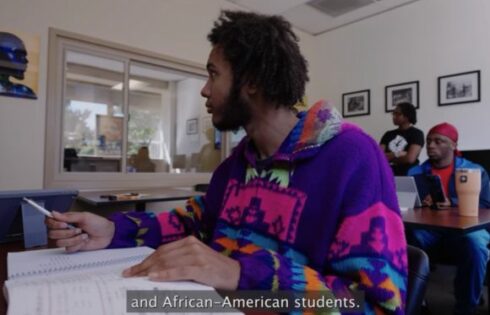
Two St. Olaf College scholars argue approach ‘prioritizes students’ process and growth instead of a single standard of writing’
Two writing professors at St. Olaf College are calling on their faculty peers and campus writing tutors to prioritize what they call “labor-based grading,” which puts a de-emphasis on calling out and correcting traditional writing errors.
“This approach to responding to student writing prioritizes students’ process and growth instead of a single standard of writing,” stated writing professors Bridget Draxler and Diane LeBlanc in an article on the college’s website.
Such a method, the two argued, would “decenter white, upper-middle class educational and social experiences” and help students feel more confident and accepted.
Draxler is associate director of writing, speaking and academic support and an assistant professor of writing at the Minnesota-based private college, and LeBlanc is director of its writing program. Neither responded to requests for comment from The College Fix.
MORE: Professor says grading, good grammar examples of white supremacy
Their call for new grading tactics is a result of a multi-year research project. They looked at two writing courses at St. Olaf that serve students “from underrepresented groups, including recent immigrants, refugees, first-generation and low-income students, and students from racial and linguistic minority communities,” according to the article on their project.
To develop their assessment, the professors had examined three types of data: academic records, student interviews and faculty workshops.
They stated that their research found that “the kind of writing instruction and evaluation students receive powerfully shapes their sense of belonging at the college.” With that, the two writing professors called for kinder, gentler grading tactics.
“Our ability as professors to teach rhetorically rather than prescriptively — that is, to see writing not as simplistically right or wrong, but as attuned to the interconnected forces of writer, reader, topic, and context — allows us to more inclusively affirm and welcome the voices of all our students into the scholarly conversation,” Draxler and LeBlanc stated in the article.
“We are heartened by the ways in which our colleagues are thoughtfully questioning feedback and grades that over-emphasize errors and affirming writing that represents students’ diverse identities, experiences, and voices,” they added.
“At the same time, students feel ongoing pressure to meet writing standards defined by a dominant language and culture. We hope that our project results continue to inform assignments, feedback, and future assessment to reflect a more inclusive understanding of whose writing is valued in our community.”
Draxler and LeBlanc stated they will push for greater inclusivity within the writing program:
“We plan to draw from our research to create opportunities where faculty and writing tutors can assess their own bias and learn to respond to variations in student writing and language in Writing and Rhetoric and First-Year Seminar, the two new First-Year Experience courses.”
The project is part of a larger St. Olaf initiative promoting inclusivity.
The initiative, called “To Include is to Excel,” awards grant money to various professor-led research projects designed to “enhance faculty expertise and seed curricular and pedagogical excellence,” according to the grant proposal.
“To Include is To Excel is a four–year, $800,000 initiative funded by the Andrew W. Mellon Foundation that stimulates faculty development and supports curricular transformation to serve new generations of students. […] We envision all students pursuing excellence and encourage all to develop their own sense of mission in a world that desperately needs their talents. Such a vision calls us to transform our approaches to teaching in dialog with our students and each other,” the initiative’s website states.
“Supporting Diverse Writers” was among the first wave of grant recipients in 2018. Today, there are more than 50 To Include is to Excel projects, according to the college.
Other noteworthy projects include “Decolonizing Collection, Exhibitions, and Curriculum,” “Engaging Introverts in the Musical Classroom,” and “Race Matters.”
The small liberal arts college made national headlines in 2017 for a scandal involving a hate-crime hoax.
MORE: University lowers traditional language standards for Black Lives Matter contest
IMAGE: Shutterstock
Like The College Fix on Facebook / Follow us on Twitter





Please join the conversation about our stories on Facebook, Twitter, Instagram, Reddit, MeWe, Rumble, Gab, Minds and Gettr.